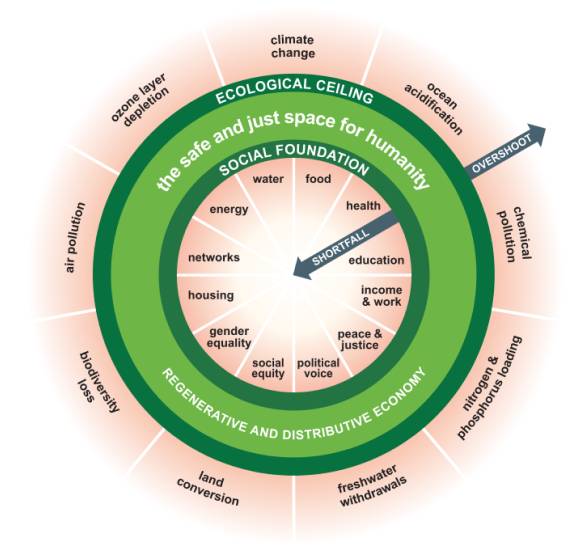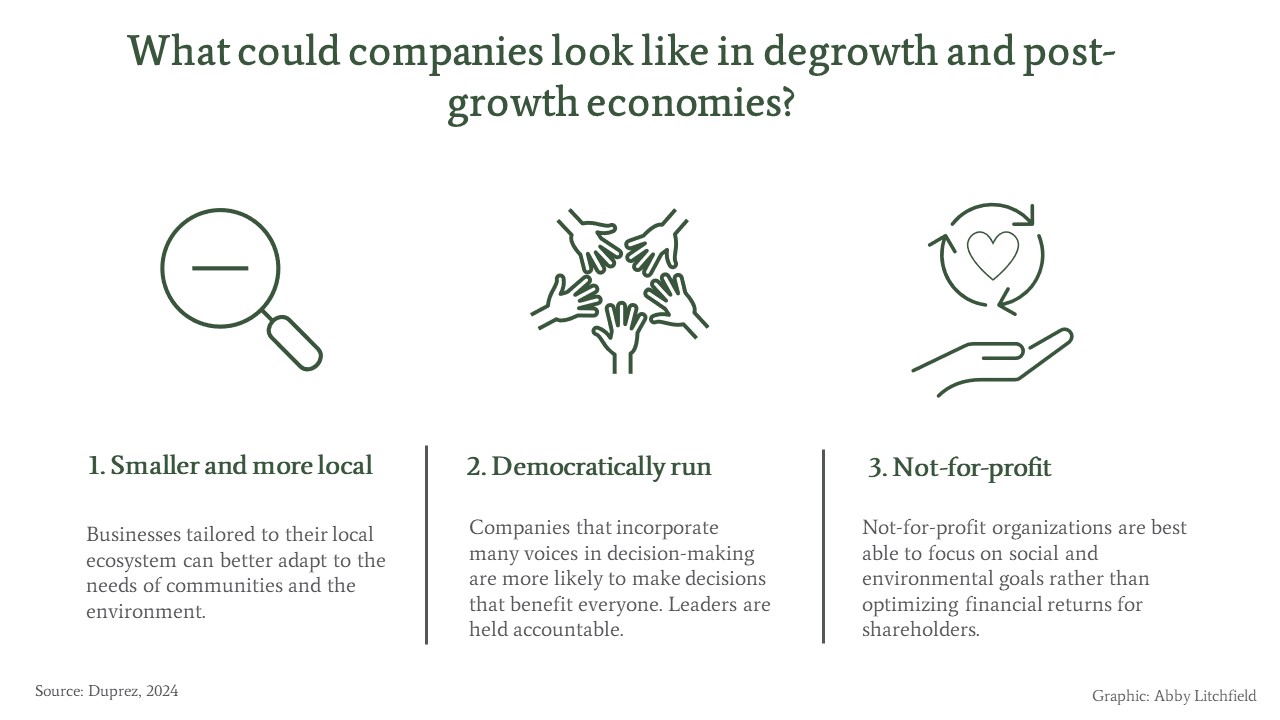The “Degrowth” and “Post-Growth” movements imagine a world with new goals beyond profit. What does this mean for business?
It can be hard to imagine a world beyond profit and economic growth. Those are the goals that have driven our economic systems for centuries. They shape our definitions of success.
But the endless pursuit of profit and growth is increasingly unsustainable. It’s pushing the planet past environmental boundaries and toward inequality and social unrest. And it isn’t making us happier (once people’s basic needs are met, additional wealth has little effect).
Advocates for “degrowth” and “post-growth” see an alternative. They imagine a world with an economy that’s much smaller than our current one, focused on healthy social connections and environmental sustainability.
I recently wrote about the basic elements of degrowth and post-growth. If you’re interested in a primer on the topic, that’s a great place to start. In this article, I explore what it means for companies to execute on these ideas.
First, some definitions. Formally, degrowth is a “planned and democratic reduction of production and consumption in rich countries to reduce environmental pressures and inequality, while improving well-being.” That’s according to economist Timothée Parrique, a leader in studying degrowth. Degrowth is a transition period leading to post-growth – a new stable economy with less production and consumption, in balance with nature.
This article explains:
-
How degrowth changes the economy
-
Why companies might shift from today’s growth model
-
How companies operate in a degrowth or post-growth world
-
Whether today’s companies can make that shift
I’m studying these questions in my own research for a PhD. But for this article, I also posed them to two experts:
-
Timothée Parrique, economist and researcher at Lund University School of Economics and Management (Sweden), is a prominent advocate for the concept of degrowth. He wrote “Slow down or perish: The economy of degrowth.”
-
Delphine Gibassier is a Professor of Accounting for Sustainable Development at Audencia Business School (France) and founder of Vert de Gris, which helps organizations with sustainability transformation. She contributed to the European Union’s Corporate Sustainability Reporting Directive (CSRD) standards and now works on post-growth.
This article incorporates their insights and experience.
How Degrowth and Post-Growth Could Reshape the Economy
Degrowth isn’t just about shrinking the economy. It’s about reshaping it. Less sustainable sectors and products shrink while more sustainable businesses stay constant or grow.
Sectors that shrink could include the fossil fuel sector, aviation, large cars and trucks, and cattle ranching. Growth would occur in the rail sector, low-carbon energy, health, art, etc.
Overall economic activity will decrease, with growth no longer the primary goal of business or politicians. The vision is “prospering without growth,” explained Parrique. “It’s an economy where actors prioritize sustainability, social justice, and wellbeing over financial indicators like revenues, profits, and GDP.”
This economy respects ecological limits. It’s no longer driving climate change or biodiversity loss. And it also strengthens social foundations, or basic human needs, such as education, health, and equality. There’s everything people need to live a good life within planetary boundaries.
These ideas align with other recent sustainable economic models, like the “doughnut economy” of Kate Raworth. It imagines a “safe space” for people to live, between social foundation and environmental limits. The goal is to thrive in that “doughnut.” Learn more about doughnut economics here.

Democratic planning for economy, society, and environment
This kind of major change might sound chaotic or risky, but planning is a core part of degrowth. A democratic process should lead to policies that can support everyone through the transition. Policies might include universal basic incomes, limits to maximum incomes, working time reductions, and democratic firm ownership (e.g. cooperatives).
Why Companies Would Support Degrowth
I’d argue that the ideas behind degrowth are important to spark curiosity, fresh thinking, and debate. Although the ideas aren’t yet a step-by-step guide for companies, they can help business leaders envision and shape a better future.
Why might companies support degrowth? There’s a practical reason – to keep our society and economy functioning. Our current approach is “using the world’s resources faster than they can be restored, and…releasing waste and pollutants faster than the Earth can absorb them,” according to the famous Limits to Growth report. We’re reaching many environmental “planetary thresholds,” endangering life on our planet.
More positively, many people want a life with some of the elements of degrowth, especially emphasizing wellbeing and community rather than wealth. That includes people in companies; already, the incoming generation of employees (Gen Z) is putting less emphasis on salary than previous generations have, and more emphasis on well-being, equity, flexibility and corporate responsibility.
Degrowth advocates envision a world where people work less, but can count on their needs being met. Fundamentally, it’s about a value change: wellbeing and sustainability over profit and growth.
Could our system change?
Could this value change occur? Well, for thousands of years, economic systems had very strict moral rules that often limited the pursuit of profit. Our current “free markets” are relatively recent. Even now, we have some regulations focused on society’s interests rather than profits (e.g. regulating advertising, environmental protection, etc.).
Some corporate role models already consider social purpose more important than profit. For example, Mustela, the European leader in baby and child care, will stop selling baby wipes by 2027 for environmental reasons. The company is putting the environment before profit, anticipating a 20% loss of sales in France.
Indigenous communities represent another model of social and environmental values, leading to different approaches to production and consumption. Another NBS article explores indigenous economic development models. “Learning from others could reshape our measures of success and our relationships with both people and nature,” said Gibassier.
How Companies are Organized in Degrowth and Post-growth Economies
How do companies operate in a smaller economy, focused on goals of wellbeing rather than profitability?
Expect businesses to be substantially smaller than today’s businesses, to be democratically run and organized as not-for-profits. Below we detail each of these elements, and how tax and accounting systems will change.
Companies will be smaller
Why would a company go small? It can be good for the business and the planet.
Businesses tailored to the local ecosystem are often more adaptable, said Gibassier, “it’s about fitting your environment, not conquering the world!” She described a retailer that refocused its business from operating in many countries to operating solely in France. They became better adapted to the market and created more local jobs.
Smaller companies may also make it easier for the global economy to shift toward sustainability. Currently we have “‘too-big-to-be-sustainable businesses’ with enough power to block any ecological transition,” said Parrique. It’s similar to the situation after the 2008 financial crisis, he said, when “discussions arose about the necessity to split ‘too-big-to-fail’ banks that became a risk for the whole economy.” Huge companies may also be less accountable, with supply chains stretching across the world.
Imagine slicing these companies into smaller, more grounded, more local and more democratic entities, said Parrique. Their environmental footprint would likely improve and their power and leverage to shape policy would diminish.
Companies are democratically run
Democratic principles include broad participation in decision-making, leader accountability, and thoughtful, open deliberation. Degrowth envisions these ideas applied to companies as well, for better decisions that benefit everyone. Decisions should be taken collectively and not for the benefit of a minority within the company.
For example, cooperatives are owned and democratically run by workers. Consider the French Société Coopérative d’Intérêt Collectif (SCIC), said Parrique. It’s a cooperative with a social interest mission. The legal structure requires that profit be reinvested in the company, includes diverse stakeholders such as workers in governance, and requires external auditing.
Such democratic governance leads to sustainability gains. Look at French energy company Total Energies, said Parrique. If it operated as a SCIC (collective interest cooperative company), it would probably stop fossil fuel extraction. “The only reason it continues is due to a small group of shareholders prioritizing maximum returns on their investment,” he said.
Many new governance models are emerging. Companies with shareholder foundations allow employees to buy back their own companies. B Corps, social enterprises and purpose companies in France are also good examples of the transition underway, said Gibassier.
Democractic governance can also mean cross-sector collaboration. That’s a core part of addressing sustainability. Gibassier gave the example of SeaBOS (Seafood Business for Ocean Stewardship), a collaboration that tackles broad challenges like overfishing and modern slavery.
Companies are not-for-profit
In a sustainable society, both profit and GDP become “outdated,” said Gibassier. There are new metrics of success, said Parrique: “Only companies demonstrating ecological sustainability and possessing a clear, legitimate mission for the common good should be legally allowed to operate.”
When companies are not-for-profit rather than for-profit, they can focus on social and environmental goals rather than financial returns and shareholders. “The profit motive is a near-pathological deviance that should be considered inappropriate anywhere except inside casinos,” said Parrique.
All existing companies could – in theory – transition to not-for-profits.
Accounting and metrics look different
Today’s tax and legal structures require a double-entry system that ends with a profit and loss account. What would “accounting for sustainable development” look like? It would link economic actions with social and ecological indicators (like planetary boundaries), according to recent research.
You can see this approach in “full-cost accounting,” or “true-cost accounting,” which tries to include organizational impacts (externalities). Eosta, a Dutch grocer, used a True Cost Accounting method to see how its economic activities affect water use and soil erosion at farms.
These approaches are still evolving: “We haven’t yet gone far enough,” said Gibassier. She argues for including the “forgotten stakeholder” (the next generation), and the “silent stakeholder” (earth and our shared resources).
How to move to a post-growth business model?
Degrowth may be necessary for a livable future. But for some, it also feels radical or intimidating. Companies can get started gradually, by asking questions and considering alternatives.
Remember that the ideas behind degrowth are important to spark curiosity, fresh thinking, and debate. They aren’t yet a step-by-step guide for companies, but they can be part of your company’s visioning for the future.
“A lot of organizations […] understand the need for change but are still looking for economic growth,” Gibassier explained. When she works with companies as a consultant, she urges them to reconsider their role in society and their value chain. The transportation and logistics sector, for instance, might fix new targets aligned with sustainability issues. They could find ways to consolidate trips and minimize energy use, while also questioning what and why they transport. Transportation can be more efficient, but it should also consider “sufficiency” – what is truly needed?
Organizations more ready to change can shift to non-profit legal status. This change could include spreading ownership across a broader group of stakeholders and even organizing a “stakeholder convention to define the social and/or environmental purpose of your business,” said Parrique.
There’s still a long way to go. Organizations must be innovative and daring in responding to the major challenges of our time. Asking questions and being open to change can help organizations break free from the myth of economic growth and reshape the way we think about the economy.
Click here to access to the full interview with Timothée Parique and Delphine Gibassier [Full-Interview-Gibassier-Parrique-NBS-Degrowth-Post-Growth-2024].
Additional Resources
About Doughnut Economics. Doughnut Economics Action Lab.
Duprez, C. 2022. Degrowth Can Support Business Sustainability. Network for Business Sustainability.
O’Neill, D.W., et al. 2018. A good life for all within planetary boundaries. Nature Sustainability, 1, 88–95.
Waddock, S. 2014. Changing the Meme of Constant Growth. Network for Business Sustainability.




Add a Comment
This site uses User Verification plugin to reduce spam. See how your comment data is processed.This site uses User Verification plugin to reduce spam. See how your comment data is processed.